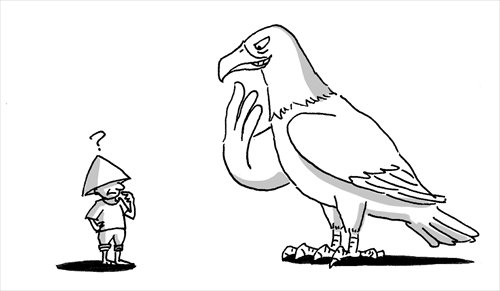HOME >> OP-ED
How close can Washington and Hanoi be?
Source:Global Times Published: 2015-6-2 20:23:01

Illustration: Liu Rui/GT
US Defense Secretary Ashton Carter started his visit to Vietnam on Sunday. On behalf of Washington, Carter has pledged $18 million for Hanoi to buy US-made patrol boats to improve the country's defense capabilities. He also visited a Vietnamese coast guard vessel that was hit by a Chinese ship last year. Moreover, a Joint Vision Statement on Defense Relations was signed by Vietnam's Defense Minister Phung Quang Thanh and Carter. Although the statement enjoys more symbolic meaning than practical significance, all these moves seem to have indicated that the two arch-enemies 40 years ago have gone much further today than just "leaving the past behind."
During his tour, Carter also asked Vietnam to halt island-building and construction in the South China Sea, a note that is deemed as a balancing voice for China.
When former US secretary of state Hillary Clinton visited Hanoi in 2010, she started the US "smart power diplomacy" of uniting Vietnam and other China's neighboring countries. The saying that Hanoi and Washington leverage each other to deal with China's rise has been spreading ever since, with many considering it as a new perspective on the situation in the South China Sea. Nevertheless, will US fully drive Vietnam into its embrace? There are more suspicions than beliefs over this prospect.
After all, Vietnam has fought a war against the US for over a decade, which caused substantial damage for both sides. There were tens of thousands of US casualties, and over three million Vietnamese lost their lives. The nightmare to the Vietnamese brought by US bombers will be never forgotten. Yet now, facing Washington's sudden support and delivery of weapons, Vietnam, which is still a socialist state, will not be so naïve as to accept them without questioning US intentions.
Vietnamese are well aware that Washington is utilizing Hanoi to contain China in the South China Sea. Americans are not fans of Vietnam's political system. What will happen after the country throws itself into the arms of the US? The answer cannot be more obvious.
Hanoi remains vigilant toward Washington, the stance of which cannot be easily changed by Carter's sweet words. It's the same the other way around. The US will not trust Vietnam to be loyal to it.
Vietnam's feelings toward China are complicated, which is hard to find a simple description. When the country is embroiled in the territorial disputes with China, it is also fully aware that China is the living example of the legitimacy of its political system. Its nationalism, which was sparked by territorial disputes, is very likely to become political radicalism that will hurt itself. Thus, if this nationalism is to be reined in, Hanoi needs to bring its conflicts with China under control.
Beijing has always been taking a firm stand and making great efforts to maintain a good relationship with Hanoi. China adheres to its principles when it comes to territorial issues, yet China is never a strategic threat to Vietnam. Hanoi is going on a path of reform and opening-up like Beijing, whose inspiration and support will prove to be valuable political resources for the country.
China and Vietnam will always be neighbors. They are on each other's doorstep not only on land, but also at sea. Just as the two countries solved the border disputes on land, the maritime controversy should also be settled with negotiation and a peaceful resolution. Interventions from external forces will never be in favor for the welfare of people in the two nations, and their only intention is to guide Beijing and Hanoi into rivalry.
In this regard, both governments and their people should stay cool-headed, and not disturb the current ties by temporary wrangles.
The article is an editorial from the Chinese edition of the Global Times on Tuesday. opinion@globaltimes.com.cn
Posted in: Viewpoint